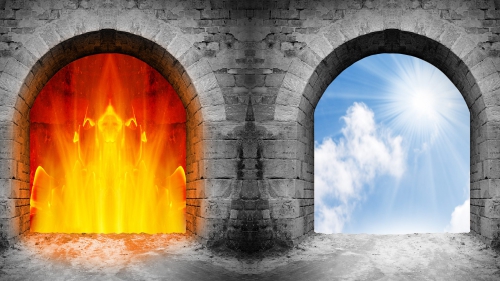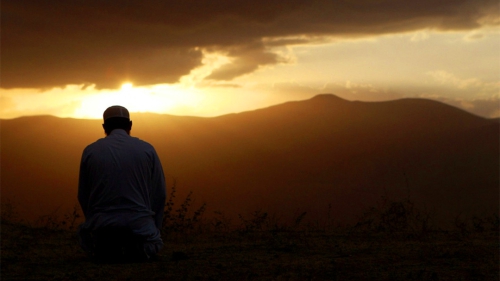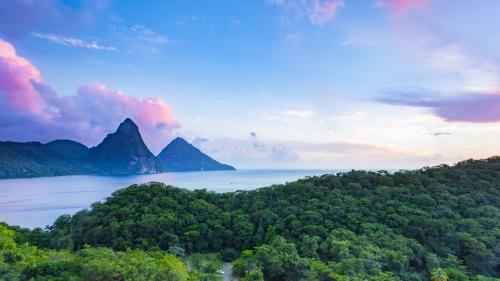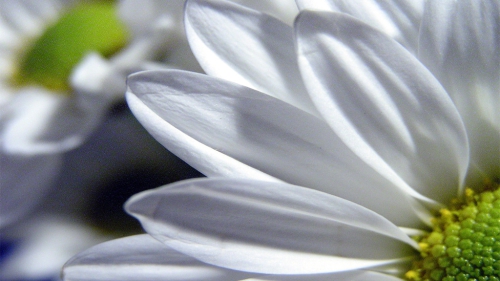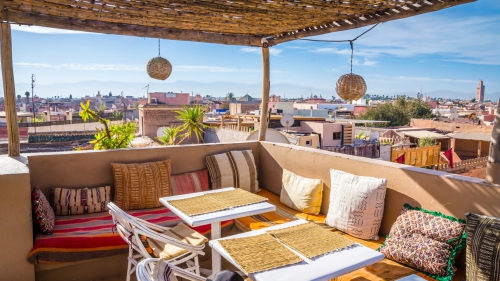Paradise and Hell
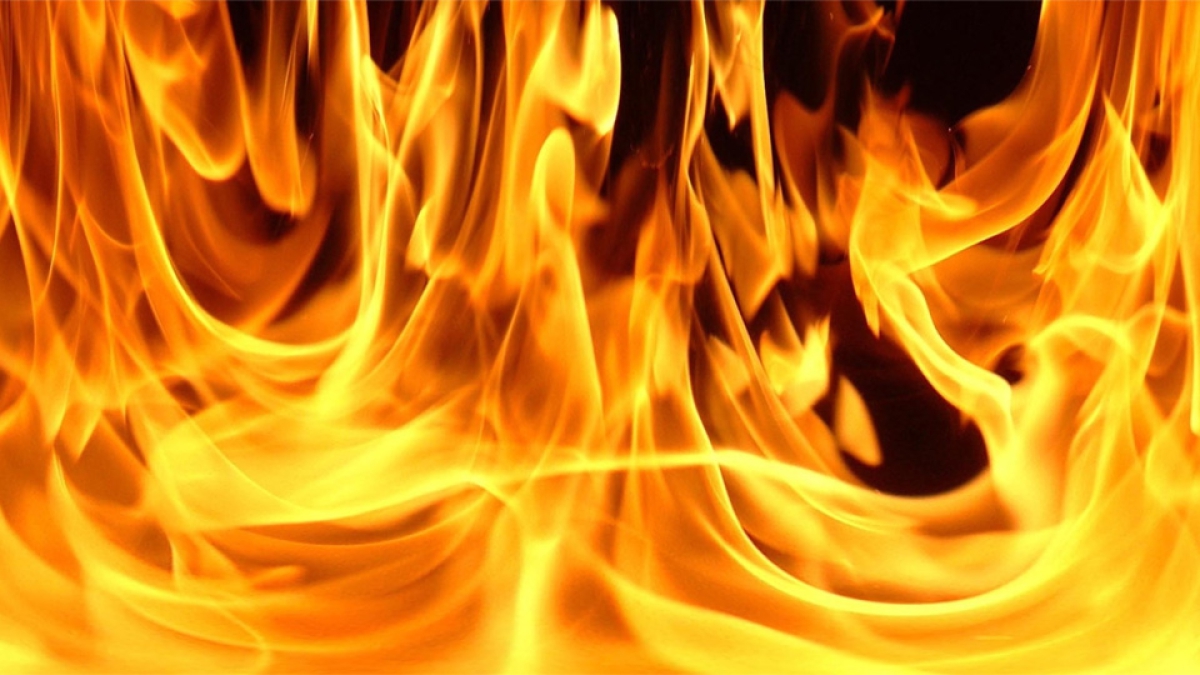
Imagine that you knew the angel of death was coming to you in a few hours. What would your first thought be?
For most of us, it would be: What have I prepared for the next life?!
Doctors today speak of how people are living longer than ever before. In some countries, people live well beyond 90 years of age. Some of us may delay doing good deeds because we think we have a long life ahead of us. But, when Allah speaks of the Day of Judgment, He
tells us that people will feel that they've only stayed in the dunya (this life) for a day or part of a day or even an hour. While 90 years is a long time to live, it does not compare to eternity. People will only realize that the next life is truly everlasting when they are standing in front of Allah
and are seeing it with their own eyes. This is why the strongest motivation for a believer to do good deeds and stay away from sins, after seeking the pleasure of Allah
, is to remember death and the hereafter.
As humans, we are prone to forget and we are quickly distracted by the glitter of this world. To keep this reminder constantly in our minds, Allah mentions the hereafter on every page in the Qur'an.
Yet even though we are constantly reminded of Hell-Fire and Paradise in the Qur'an, we do not truly comprehend their nature because we do not understand their descriptions and meanings in the Qur'an and Sunnah (tradition of the Prophet ). If we truly understood the nature of the Fire, we would fear it as it should be feared. And if we understood the real nature of Paradise, we would yearn for it as it deserves to be yearned for.
Allah discusses both Hell and Paradise equally in the Qur'an, displaying the balance of our religion. The two wings of a believer are fear and hope, and just as a bird cannot fly without balanced wings, the believer cannot either. Insha'Allah (God willing) we will be following this example for our series; posting one topic about Hell-Fire and the next about Paradise to balance our hope and fear in Allah
. Each week, we will learn about a new aspect of Hell or Paradise including:
| The Names and Descriptions of Paradise and Hell The Entrance into Paradise and Hell The Food and Clothing of Paradise and Hell The Entertainment of Paradise and Hell The Conversations of the Inhabitants of Paradise and Hell The Supplications of those in Paradise and Hell |
The first part we will cover are the Names and Descriptions of Paradise and Hell. By learning their names and descriptions, we will be able to comprehend the true nature of jannah (Paradise) and nar (Hell-Fire). Names and descriptions allow us to understand different aspects of each, as each name and description gives us a new perspective on these final abodes.
Understanding the Fire
When we think of Hell-Fire, we compare it to the fire that we have in this world. We think of our stove or fireplace; yet the Fire of Hell is more intense and severe. The Prophet said, "Your [ordinary] fire is one of 70 parts of the (Hell) Fire." Someone said, "O Allah's Apostle, this [ordinary] fire would have been sufficient (as a punishment)!" Allah's Apostle
said, "The (Hell) Fire has 69 parts more than the ordinary [worldly] fire, each part is as hot as this [worldly] fire." (Bukhari)
In another well-known narration, the Prophet said, Hell-Fire will be brought forth on the Day of Judgment with 70,000 zimaam each pulled by 70,000 Angels," (Muslim). The word zimaam is usually translated as "chains" but a more fitting translation is "leashes". What do leashes restrain? They restrain animals. Hell-Fire is a living, breathing monster. To put this into perspective, let us remember the magnificent creation of the Angels. The Prophet
described the Angels who hold Allah's Throne saying, "The distance between his ear-lobes and his shoulders is equivalent to a seven-hundred-year journey," (Abu Dawud). The Angels are not a small creation, and they will be pulling and restraining this monster.
Allah describes the animalistic nature of the Fire in the Qur'an:
 |
| "When the Hellfire sees them from a distant place, they will hear its fury and roaring," (Qur'an 25:12). |
Before the inhabitants of the Fire even see it, they will hear its anger and rage from far away. How far? Imam Al-Suddi says the distance of 100-years' travel.
Allah uses a human emotion to describe the Fire, gaydh, which means a furious anger and rage. Why is the Fire angry? The scholars say that it is angry at peoples' disbelief and disobedience to Allah
!
Allah tells us how the Fire will roar:
|
|
 |
| "When they are thrown into it, they hear from it a (dreadful) inhaling while it boils up. It almost bursts with rage [...]" (Qur'an 67:7-8). |
Jahannam, Jaheem, and Hutumah
Among the names of Hell-Fire is jahannam. Jahannam (جهنم) appears in the Qur'an 77 times, and is one of the more well-known names of Hell-Fire. Allah says:
 |
| "And for those who disbelieved in their Lord is the punishment of jahannam [...]" (Qur'an 67:6). |
Jahannam has several meanings:
The literal meaning is to meet with a frowning face and to have a stern look. When you look at a person who has jahm, you become fearful.
Darkness. Jahm is used for the darkest part of the night. One of the biggest fears people have is being in complete darkness. Jahannam is a dark place where you don't want to be alone.
A waterless cloud. A cloud without water brings disappointment and does not provide any comfort.
Put these meanings together and jahannam is a place that looks scary, is completely dark, and provides no comfort.
Another name of Hell-Fire is jaheem. Allah says:
 |
| "And Hellfire will be brought forth for the deviators," (Qur'an 26:91). |
Al-Jaheem (الجحيم) appears 23 times in the Qur'an. These are among the meanings of this name:
| The literal meaning is to light and stir up a fire-you add fuel and ensure it keeps burning. The word jahama means to stare with sharp eyes, and refers to the way a lion stares at its prey. The word ajham, from the same root, means someone who has red eyes. Jaheem is also used for a pit with blazing fire-and not just any fire, but an extremely hot, intense, and fiercely-burning fire. |
Next time Shaytan (the devil) whispers to you and you are inclined to commit a sin, remember this description of Hell-Fire, like a lion staring at its prey, waiting to pounce on it:
 |
| "Indeed, Hell has been lying in wait," (Qur'an 78:21). |
Another name of Hell-Fire is al-hutamah. Allah says about the one who slanders and backbites:
 |
 |
 |
| "No! He will surely be thrown into al hutamah. And what can make you know what is al hutamah? It is the fire of Allah, [eternally] fueled," (Qur'an 104:4-6). |
Hutamah is one of the descriptive names of the Hell-Fire and it is from the word hatama which means to crush something to pieces. Hutamah is also used to describe a person who eats a lot and is never satisfied. When we eat, we must chew our food first, and then we are able to digest it. Similarly, the Hell-Fire will crush everything as it consumes. It will crush and mash everything thrown into it. Allah tells us in Surah Qaaf (Chapter of the letter 'Qaaf') that Hell-Fire will say: hal min mazeed? "Is there any more (to consume)?" (Qur'an 50:30)
Allah describes al-hutamah further by saying it is: naar allahil mooqadah: it is the fire of Allah, kindled.
This Fire is attributed to Allah and when the idaafah (possession) of something is to Allah
, it gives great importance to that thing. Hell is such a great fire that only Allah
can light a fire of this nature.
It is al-mooqadah: the one that is kindled. It is already burning right now; it has been lit and set ablaze. It is not going to be started on the Day of Judgment.
Furthermore Allah says:
 |
| "Which mounts directed at the hearts," (Qur'an 104:7). |
This fire will not be limited to the external body, rather it is going to consume the body and reach the core. It will penetrate through the body. This hutamah will be such a great consumer that it will consume all the way to the hearts.
This is Hell-Fire: a fierce Fire that is the crusher of bones, bursting with rage and fury and brought forth before us with leashes pulled by 70,000 angels.
O Allah, we beg You to protect us from this abode!
Source: SuhaibWebb - Amatullah
A place like we have never seen. A place we can hardly imagine. A place of no sadness, no hardships, no heartache. Eternal bliss. A place that we crave and that craves us. Allah has blessed us with a gift beyond measure that makes every struggle we have ever had to endure worthwhile.
Jannah. Paradise.
Understanding Paradise
Paradise is the ultimate achievement, the epitome of success and the greatest of rewards. Allah rewards His obedient servants with Paradise-a reward we only earn through His Mercy. The Prophet
said: "No one of you will be saved because of his deeds." They (the Companions) said: "Not even you, O Messenger of Allah?" He said: "Not even me, unless Allah bestows mercy upon me," (Bukhari).
While the translation of this narration says, "unless Allah bestows mercy upon me," the Arabic word has a deeper meaning. "Yataghamadani" literally means "to completely submerge me." [Lisan al-Arab] It gives the meaning of envelopment, engulfment, covering and immersing. Paradise is so magnificent that we can only enter it if Allah drowns us in His Mercy.
In a prophetic narration, Allah said to Paradise, "You are My Mercy which I bestow on whoever I wish of My servants," (Bukhari).
On the Day of Judgment, Allah will bring Jannah in the presence of the Believers. He
says, "And Paradise will be brought near to the righteous, not far," (Qur'an, 50:31). After enduring the hardships of this worldly life and the grave, then seeing the horrors of the Day of Judgment, Allah
eases the hearts of the Believers by bringing their final destination close to them before they enter it.[Tafsir al-Sa'di] Imagine you are a traveler on a long and arduous journey. When you come closer and closer to your destination, you forget the hardships you've endured because your end is in sight. Now imagine the state of the Believers at this time-instead of walking to jannah on their own, jannah will come to them!
Jannah is beyond our imagination. The Messenger narrated that Allah
said, "I have prepared for My righteous slaves that which no eye has seen, no ear has heard and has never crossed the mind of any human being." The gardens, fruits, mansions, drinks, trees and rivers of Paradise are not like those we see now; rather they only share a similar name. Jannah is far greater than anything our minds can ever envision. It is beyond our wildest dreams.
Jannah, Al-Firdaws, 'Adn, and Dar al-Salaam
Jannah in itself has many names, signifying its utmost importance. Simply by looking at the meanings of a few of these names our hearts become attached to our hopeful abode, knowing that if this is the beauty that exists within each of her names, what then of the actuality of jannah?
The most well-known name of jannah is jannah itself. It appears more than 50 times in the Qur'an.
Allah says:
 |
| "And as for those who were [destined to be] prosperous, they will be in al-jannah [Paradise], abiding therein as long as the heavens and the earth endure, except what your Lord should will - a bestowal uninterrupted." (Qur'an, 11:108) |
The root of this word has several meanings. Of them are:
To be hidden. The name for a fetus is known as "jinan" because it is hidden in its mother's womb. Also, from this root is "jinn" because they are a hidden creation.
A garden with many trees and vegetation.
Allah has hidden jannah from us in this world, but we still believe in it. It motivates us more to strive for it. When a gift is described to us before we see it, it excites us more and makes us happier when we finally receive it. Allah
and His Messenger
have given us beautiful descriptions of jannah to motivate us to do good deeds and to make it more special when we enter it, insha' Allah (God willing).
The next name, al-firdaws, is the name of the highest place in jannah. The Prophet said, "When you ask Allah (for something), ask for al-firdaws which is the best and highest part of Paradise," (Bukhari).
It is used in two places in the Qur'an, one of which is this verse in Surah Kahf (Chapter of the Cave):
 |
 |
| "Indeed, those who have believed and done righteous deeds - they will have al-Firdaws [the Gardens of Paradise] as a lodging, wherein they abide eternally. They will not desire from it any transfer." (Qur'an, 18:107-108) |
The word firdaws is said to be of a non-Arabic origin, literally meaning vastness. The scholars give multiple meanings and descriptions of firdaws: a combined meaning of a trellised garden, specifically with grapevines, as well as fruits and vegetation of all kinds. [Sharh Abyat al-Jannah min Nooniyyah ibn Qayyim al-Jawziyyah by Imam al-Alusi]
The fact that Paradise is a garden is emphasized with both of these names highlighting the beauty that gardens have. Nowadays, the mere sight of greenery, flowers and trees brings about calmness and tranquility to the heart. Paradise is a place full of green trees, beautiful flowers, and trellised gardens. Not only beautiful in appearance, but also beautiful in the emotions it triggers.
Another name of jannah is `adn. `Adn is known as the proper name of Paradise, and included within the name is a meaning of many gardens - jannat. Jannah is not just one big garden; it also contains many, many gardens within it. Allah says,
 |
| "[Therein are] jannat `adn [gardens of perpetual residence] which the Most Merciful has promised His servants in the unseen. Indeed, His promise has ever been coming," (Qur'an, 19:61). |
`Adn literally means a place of residence. A word from the same root, ma`din, means a place that people stay in during summer and winter. `Adn also refers specifically to the middle of a garden where rivers meet, producing more trees and vegetation around it. Again, we see the characteristic of gardens and vegetation within this name of Paradise.
Jannah is also called dar al-salaam:
 |
| "And Allah invites to dar al-salaam [the Home of Peace] and guides whom He wills to a straight path." (Qur'an, 10:25) |
In another verse, Allah says about the Righteous,
 |
| "For them will be dar al-salaam with their Lord," (Qur'an, 6:127). |
Al-Salaam is one of the Majestic Names of Allah . It has two meanings: the One free of all faults and deficiencies (The Perfection) and the Giver of Peace and Security. [Ibn Kathir] From these similar meanings, jannah is called dar al-salaam because it is a place free of all grief, death, worries, tensions, fatigues, enmities, and hatred; and it is a place of safety. It is also called dar al-salaam because Allah
, Al-Salaam, will greet its inhabitants as they enter. He
says, "[...] their greeting therein will be, 'Peace,'" (Qur'an 10:10). Similarly, the Angels will also greet them:
 |
 |
| "And the angels will enter upon them from every gate, [saying], 'Peace be upon you [assalaamu `alaykum] for what you patiently endured. And excellent is the final home,'" (Qur'an, 13:23-24). |
Yet another meaning of dar al-salaam is that it is a place where its speech is salaam-meaning free of all negative and evil talk. As Allah describes, "They will not hear therein ill speech or commission of sin - Only a saying: 'Peace, peace,'" (Qur'an, 56:25-26).
It is dar al-salaam because there will be no enmity nor hatred among the inhabitants of Paradise. The Prophet said, "They will neither have differences nor hatred amongst themselves; their hearts will be as if one heart," (Bukhari). Allah
says,
 |
| "And We will remove whatever is in their breasts of resentment, [so they will be] brothers, on thrones facing each other," (Qur'an, 15:47). |
Allah says about the Believer who dies in a good state, "Then [the angels will say], "Peace for you; [you are] from the companions of the right," (Qur'an, 56:91). The believer will have salaam (peace): they will leave this worldly life in a good state, with the Angels giving them glad tidings of Paradise, protection from the Fire, and the ultimate pleasure of their Lord.
Source: SuhaibWebb - Amatullah
Related Suggestions









